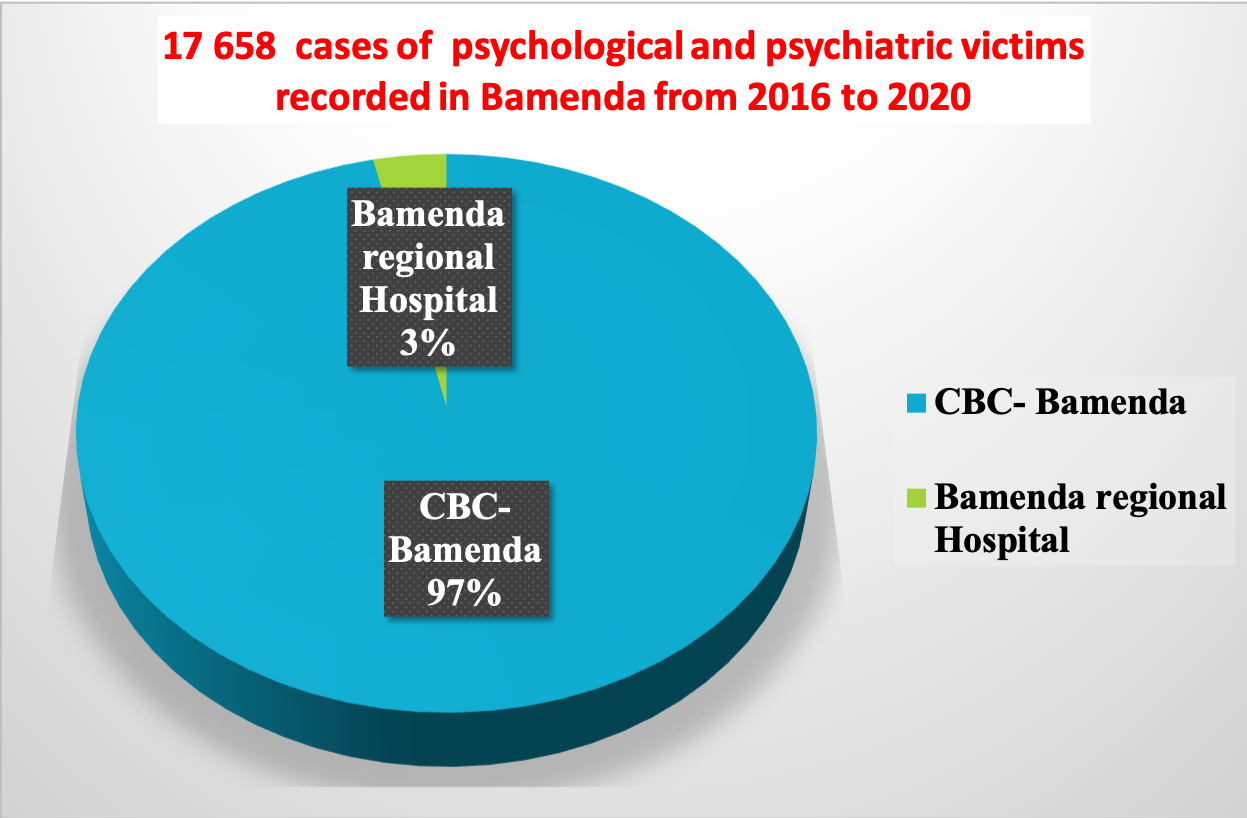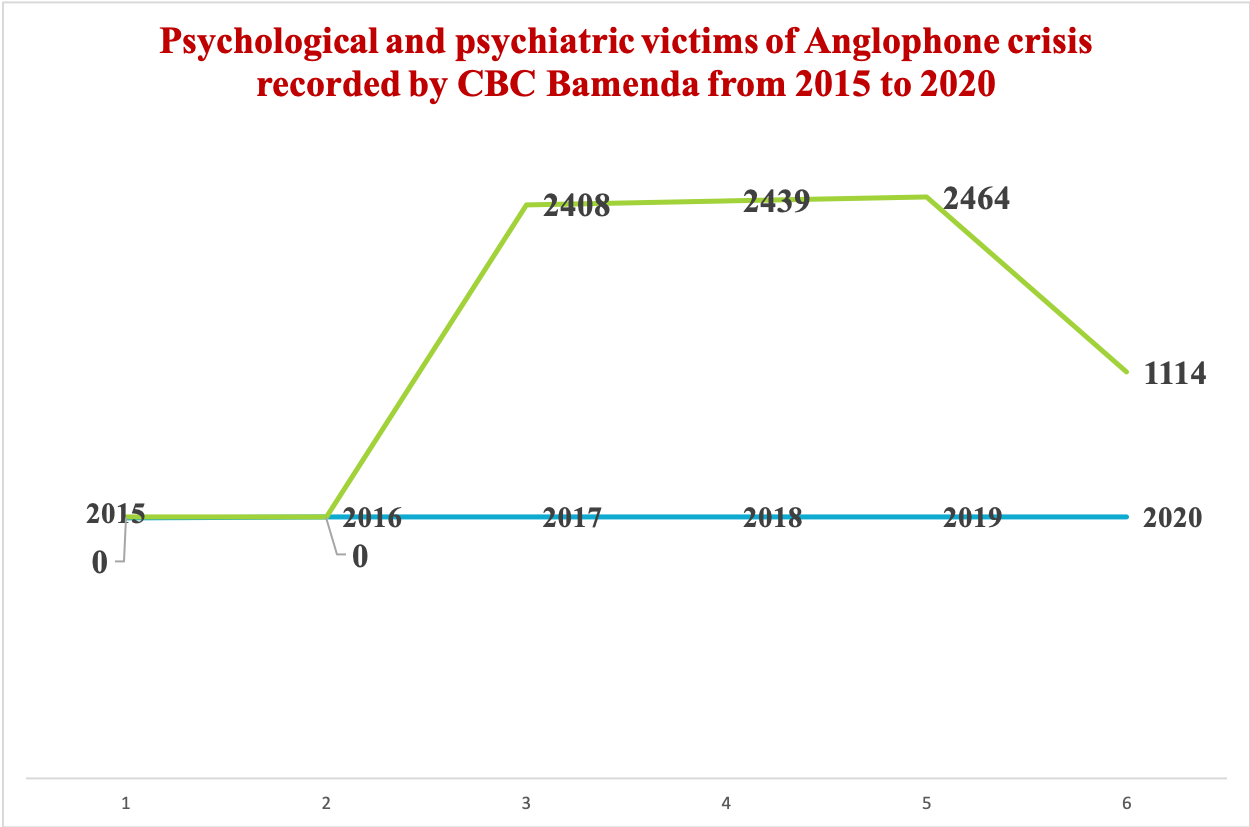Anglophone Crisis: More than 17 168 cases of psychological and psychiatric damage recorded in Bamenda

Analysis of the data collected by the CCBC and the Bamenda Regional Hospital shows a dizzying increase in 2017 and a constant increase until the end of 2019. 9 months after the start of 2020, the number of cases is less than half of Last year.
According to these health officials, the reoccurrence of killings, bomb explosions, kidnapping, rape, drug abuse, physical and psychological torture have left the population of the region emotionally drained. The coming of an uninvited guest, Covid-19, has worsened the situation. Unfortunately, the region is yet to get sufficient support units to tackle the rapid increase of these psycho-social cases.
Rev. Dr, Ndongdeh Godlove Nkwain, Head of the community counseling Clinic of the Cameroon Baptist Convention Health Services (CBCHS) Bamenda, affirms the health sector in Cameroon has to step up its response to the rapid growth of mental health cases in the conflict zones.
“The few support units that exist in the region are over-stretched due to limited skilled staff available to handle the cases we have on the field,” Rev Godlove added.
To Franklin Ngwem, supervisor of mental health for CBCHS Bamenda, mental health issues are common in life. The Anglophone crisis and Covid-19 pandemic are boosters in the risk factors that amplified the number of persons affected by mental illnesses in the region.
“The effect of these crises on residents will show later in the future and will affect them in gradual progress. Therefore, it is vital to have appropriate mental health units in the region to help the population”.
At the Cameroon Baptist Convention Health Services in the North West region, from 2017 to 2020, a total of 16,568 patients have received psycho-social support, with 55 percent being females and 45 percent males.

According to Franklin Ngwem, women are more vulnerable to abuse and other environmental factors than men. They seek help at the mental facilities than men do.
“Our African culture makes men think they can deal with their problems on their own, but scientifically, that’s not true. Many men turn to use substances like cigarettes and alcohol as a way of dealing with their problems. In the future, these men develop more complications than women”.
Njiyap Claude Francois, a mental health specialist at the Bamenda Regional Hospital and Head of the psycho-social support unit concerning Covid-19 in the region, says there were few psycho-trauma cases before the Anglophone crisis started in 2016. The dual crises have tripled the number of cases at the hospital.
At the Bamenda Regional hospital, the rate of patients has increased from 30 to 50 monthly, compared to less than 15 patients received in 2016. As of May 2020, the hospital recorded 600 patients in the psycho-social support unit.
“I can only talk about those who consult at the hospital. Other cases don’t go for help or go elsewhere. Many teens now abuse hard drugs to deal with isolation (no school). Most come at a chronic stage because of lack of money or other perceptions”, says Francoise Njiyap.
The ongoing armed crisis has resulted to about 211,000 IDPs in the North West and South West regions (UNHCR Cameroon 2019 Supplementary Appeal, March 2019), and continue to have serious consequences on the livelihoods and living conditions of the people.
“Before the armed conflict, CBCHS had the mental health service only in one hospital and in the community counseling services. With the armed conflict, the mental health service has expanded to other parts of the region to help address the mental needs of the people. In January 2020, we started the community mental health project to train many health personnel to handle mental health issues”, Franklin added.
Providing these mental health services comes with challenges making it more demanding for a few available health personnel. Stigmatization surrounding mental health issues scared patients from seeking help and follow-ups.
“Many people are ignorant of their mental health. Some don’t know they need professional help, and others don’t know where to seek help”, says Claude Francoise.
Inaccessibility to patients due to insecurity has caused many patients in rural areas to have a relapse.
“We find it difficult to patients in Donga Matung and those communities whose roads are often blocked. We also have cultural issues that affect our services. Some people say mental illnesses are caused by demons, making it difficult to have a breakthrough with some cases”, added Franklin.
To remedy the inaccessibility, CBCHS have created toll-free numbers for those in need of mental health care: – Mbingo – 674085451 or 683747896, BBH Nso – 678588950, Nkwen – 676816818
The four years conflict has damaged the North West region of Cameroon, with more than 1,200 cases of civilian protection rights violations registered, mainly involving physical abuse or threats, and mental cruelty.
By Maikem Emmanuela











